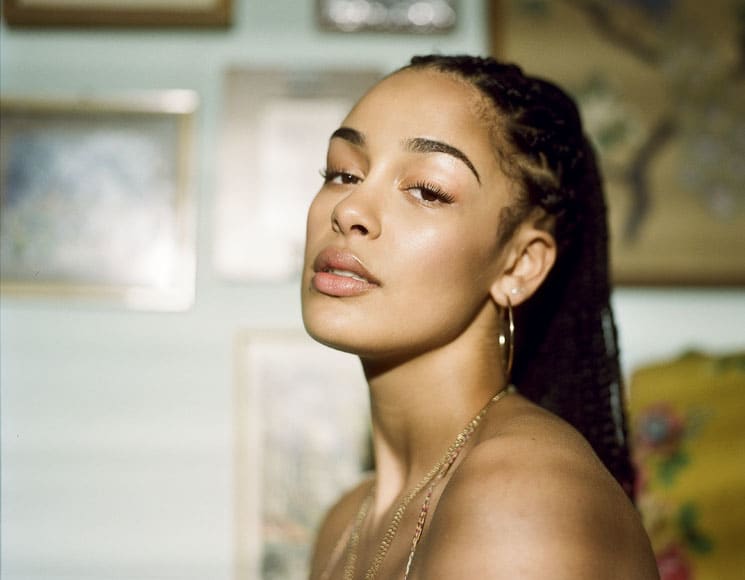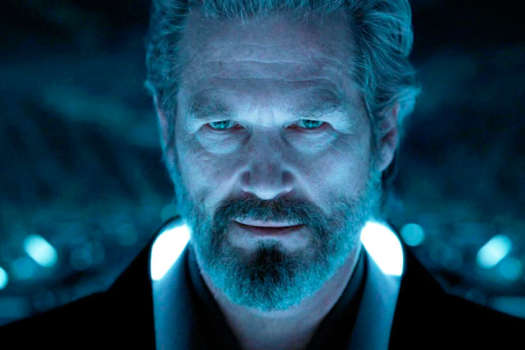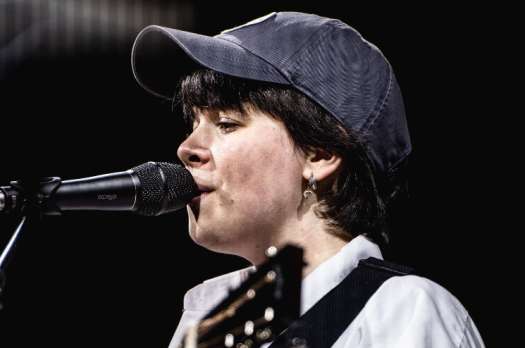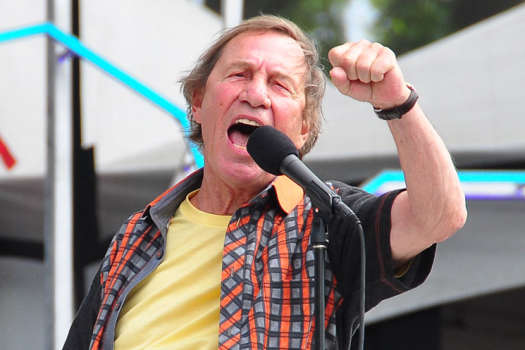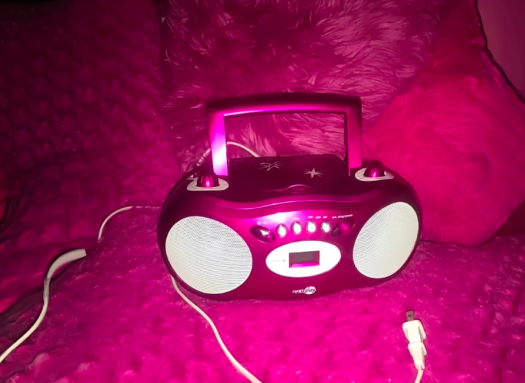It dawns on Jorja Smith that having overzealous fans figure out what hotel she's staying at while on tour is a sign she's made it. Also: it's a bit wild, a tad unreal. The soon-to-be 21-year-old UK R&B singer from Walsall, an industrial town in the West Midlands, UK, is learning that celebrity is a garment you wear, ready or not. For Smith, it's a good fit.
"Apparently, some people, after my concert, were walking along and saw someone from my team. They followed them to my hotel," she says, with an exasperated look, in the hotel bar in Toronto where we connect. "It's things like that; I guess it comes with what I do. So many people love you and wanna meet you."
From a teenage SoundCloud artist three years ago to appearing on Drake records and touring with Bruno Mars — all culminating in a hotly anticipated debut album, Lost & Found, out June 8 on The Orchard — hers is a sound and voice much in demand. There's a bold, confident quality to Smith — a breathy guilelessness anchored to an undercurrent of savvy — that belies both her age and newness to multi-city tour dates and sold-out concert halls.
"By the end of this tour, I think I'll have a million followers on Instagram," she confesses, half-bragging, half-incredulous. "That's weird. What the hell am I doing with that many followers? I don't know, that many people watching me."
Her debut album serves as both introduction and foundation. Her classically trained vocals, knack for storytelling and melodic invention carry the project. With previously released tracks like "Blue Lights," "Where Did I Go?" and "Teenage Fantasy" functioning as touchpoints, the 12-track album is firmly fixed in a slow-to-midtempo mode.
Lost & Found took about three years to create. "It was never like, 'Okay, I'm going to take three years to create an album.' I just write songs. As much as I love plans and stuff, when it comes to music — same as how I [did] my EP — they just happened. I made them, and then I was like, 'I want to put out an EP.' 'Oh, these songs will go well together, so I'm going to put them together.' That's what happened with the album; it just came to a point where I thought, 'I think this year is a good year to put out an album, because people are watching me.'"
Despite working with and having connections to names like Drake, Kali Uchis and Stormzy, it was important that the album be all about Jorja Smith. "I thought, as a first album, if people want to get to know me, then let me just do what I've always done and just release songs by myself. I think just being me, it will make more sense."
Flashback to the year 2015. Smith is a Starbucks barista, a part-time pit stop on the journey to a full-time vocation as a recording artist. She records snippets of song lyrics and melodies on her phone during breaks, all the time dreaming of fame. She recalls being a bit naive about the industry, yet determined to make it work, despite being three hours away from a more cosmopolitan life in London.
"Already, being from Walsall, I'm a bit removed from that anyway. I was just doing my own stuff and my manager [was] as well," she says. "I didn't know too much. I really had no clue, I didn't know about deals. When I was younger, I did think that in order to make it, you had to get a deal. I remember looking at Justin Bieber and wishing I was, like, 15 and had all these fans, but you know what? Everyone has their path and everyone's path is different and this is where mine's going. I just didn't want to work at Starbucks. I wanted to be writing music all the time."
Releasing single "Blue Lights" on Soundcloud in early 2016 at age 18 was both a strategic and emotional decision. The song, a mix of observational narrative and social consciousness, is a personal look at men of colour and police brutality. It underscored both her emotional core and her heightened awareness, tapping into the incongruous reality of being guilty before proven innocent for those who are marginalized.
"I wrote 'Blue Lights' because I found a knife in my friend's bag and I wrote a story on that," she says. "At the same time, I was also interviewing kids at my school, black kids, mainly people of colour — kids of colour — about what they thought about the police. They would all be like, 'Fuck the police!' I write what I know. I think, from me writing that, it's there for interpretation and I think it's opened some people's ears. That's what I do."
Singles "A Prince" and "Where Did I Go?" would follow in 2016, in addition to the four-track Project 11 EP. But it would be Drake co-signing "Where Did I Go?" that likely tipped Smith's career in the direction it's going today. She's entirely grateful for getting that recognition — and getting the opportunity to appear twice on his 2017 More Life LP, on "Jorja's Interlude" and "Get It Together" — but makes it clear that she's her own woman.
"I'm so grateful, 'cause it could have gone two ways — his fans could have hated me, like, 'Who is this?' but they really liked me. I'm just very grateful. Without More Life, who knows, but I was able to be tapped into this different audience, which I wasn't in. But yeah, I'm not just the girl from Drake's album."
The child of a Jamaican-born musician dad and an English mother, Smith recalls music being a constant in her life.
"My mom and dad always played music in the house. I'd come back home from school and there'd always be music on. Mom's making food, there's music on. My mom listened to a lot of reggae; so did my dad. Neo-soul, R&B, all sorts. So I've always grown up with music being played."
Her vocals have been likened to a youthful fusion of Amy Winehouse, Lauryn Hill and Adele. It was her father who recognized her musical potential early, after hearing her sing in a church concert. He was instrumental in ensuring she learn piano and be classically trained on vocals.
Credit the storytelling skills in her music to being well-read, and being someone who loves telling stories. "I read a lot when I was younger. I used to write stories. I always wrote stories. I talk to myself. I make up stuff. I don't know — I guess I'm good with my words. I'm not good at talking, but I can write a good song and tell a story."
Her family is both a key part in her success and also how she stays grounded. "My dad will always criticize me. He doesn't care if it hurts my feelings. If I start acting a certain way, he would be like, 'Who do you think you are?'"
With ambition comes anxiety, and Smith feels it like any artist in the spotlight. There's the pressure to have a near-perfect show, a hyper-curated social media presence and a 24/7 veneer of approachability in public. It's hard, particularly for a Gemini. Don't think too much. Don't obsess over details. These are things she's working on, but come with the territory, she acknowledges. But yeah, don't obsess over things. "We all have certain traits and flaws and stuff, which we think, 'Oh, they're weird, but maybe if I didn't have them, I wouldn't be,'" she says.
She recalls recently going to a small club while on tour to see a fellow UK artist perform, and the impact being a known commodity is already having on her personal life. "I went in for an hour and like 30 people came up to me. I realized that, for them, that is a second. For me, it's all day. I was like, I am like, 'Oh God, this is life now,'" she says. "You don't have privacy. Everyone thinks you're perfect. But I find it difficult having so many people tell you how good you are," she says.
"There are things I'm working on. Listen to music, that helps. Chill? I can't chill. I find it so difficult to sit still. I'm working on myself and self-care."
But what is within ultimately comes out. Lost & Found tracks the love, loss and hope with a "place in this world" orthodoxy that comes off as organic and intelligently parsed. Being hard on herself involves self-reflection, self-care and a self-awareness that's probably higher than most her age. While themes of social consciousness seep into her musical themes, she readily admits that she's looking for more opportunities to be more engaged and aware of what's happening in the world from a political perspective. It will happen in time, she offers.
"I need to get a tiny bit more 'woke.' I need to read more. I'm reading Malcolm X's biography at the moment; it's just really good. I really enjoy it. [Right now] I can only talk about what I know, in terms of politics. I'm 20," she says. "For me, it's about touching as many people as I can, and helping as many people as I can with my music. It's about making people feel, learn something and think twice about something [hurtful] they might have said to someone."
She pauses, before putting it all into perspective. "I can't complain, my life is like absolutely a dream compared to a lot of 20-year-olds, but everybody has their issues. I think people forget that. People think of you as objects," she notes. "So many people can tell me, 'You're amazing,' rather, but I don't think it. You know, so, I don't go around thinking this. I'm really hard on myself. I think that's quite good."
"Apparently, some people, after my concert, were walking along and saw someone from my team. They followed them to my hotel," she says, with an exasperated look, in the hotel bar in Toronto where we connect. "It's things like that; I guess it comes with what I do. So many people love you and wanna meet you."
From a teenage SoundCloud artist three years ago to appearing on Drake records and touring with Bruno Mars — all culminating in a hotly anticipated debut album, Lost & Found, out June 8 on The Orchard — hers is a sound and voice much in demand. There's a bold, confident quality to Smith — a breathy guilelessness anchored to an undercurrent of savvy — that belies both her age and newness to multi-city tour dates and sold-out concert halls.
"By the end of this tour, I think I'll have a million followers on Instagram," she confesses, half-bragging, half-incredulous. "That's weird. What the hell am I doing with that many followers? I don't know, that many people watching me."
Her debut album serves as both introduction and foundation. Her classically trained vocals, knack for storytelling and melodic invention carry the project. With previously released tracks like "Blue Lights," "Where Did I Go?" and "Teenage Fantasy" functioning as touchpoints, the 12-track album is firmly fixed in a slow-to-midtempo mode.
Lost & Found took about three years to create. "It was never like, 'Okay, I'm going to take three years to create an album.' I just write songs. As much as I love plans and stuff, when it comes to music — same as how I [did] my EP — they just happened. I made them, and then I was like, 'I want to put out an EP.' 'Oh, these songs will go well together, so I'm going to put them together.' That's what happened with the album; it just came to a point where I thought, 'I think this year is a good year to put out an album, because people are watching me.'"
Despite working with and having connections to names like Drake, Kali Uchis and Stormzy, it was important that the album be all about Jorja Smith. "I thought, as a first album, if people want to get to know me, then let me just do what I've always done and just release songs by myself. I think just being me, it will make more sense."
Flashback to the year 2015. Smith is a Starbucks barista, a part-time pit stop on the journey to a full-time vocation as a recording artist. She records snippets of song lyrics and melodies on her phone during breaks, all the time dreaming of fame. She recalls being a bit naive about the industry, yet determined to make it work, despite being three hours away from a more cosmopolitan life in London.
"Already, being from Walsall, I'm a bit removed from that anyway. I was just doing my own stuff and my manager [was] as well," she says. "I didn't know too much. I really had no clue, I didn't know about deals. When I was younger, I did think that in order to make it, you had to get a deal. I remember looking at Justin Bieber and wishing I was, like, 15 and had all these fans, but you know what? Everyone has their path and everyone's path is different and this is where mine's going. I just didn't want to work at Starbucks. I wanted to be writing music all the time."
Releasing single "Blue Lights" on Soundcloud in early 2016 at age 18 was both a strategic and emotional decision. The song, a mix of observational narrative and social consciousness, is a personal look at men of colour and police brutality. It underscored both her emotional core and her heightened awareness, tapping into the incongruous reality of being guilty before proven innocent for those who are marginalized.
"I wrote 'Blue Lights' because I found a knife in my friend's bag and I wrote a story on that," she says. "At the same time, I was also interviewing kids at my school, black kids, mainly people of colour — kids of colour — about what they thought about the police. They would all be like, 'Fuck the police!' I write what I know. I think, from me writing that, it's there for interpretation and I think it's opened some people's ears. That's what I do."
Singles "A Prince" and "Where Did I Go?" would follow in 2016, in addition to the four-track Project 11 EP. But it would be Drake co-signing "Where Did I Go?" that likely tipped Smith's career in the direction it's going today. She's entirely grateful for getting that recognition — and getting the opportunity to appear twice on his 2017 More Life LP, on "Jorja's Interlude" and "Get It Together" — but makes it clear that she's her own woman.
"I'm so grateful, 'cause it could have gone two ways — his fans could have hated me, like, 'Who is this?' but they really liked me. I'm just very grateful. Without More Life, who knows, but I was able to be tapped into this different audience, which I wasn't in. But yeah, I'm not just the girl from Drake's album."
The child of a Jamaican-born musician dad and an English mother, Smith recalls music being a constant in her life.
"My mom and dad always played music in the house. I'd come back home from school and there'd always be music on. Mom's making food, there's music on. My mom listened to a lot of reggae; so did my dad. Neo-soul, R&B, all sorts. So I've always grown up with music being played."
Her vocals have been likened to a youthful fusion of Amy Winehouse, Lauryn Hill and Adele. It was her father who recognized her musical potential early, after hearing her sing in a church concert. He was instrumental in ensuring she learn piano and be classically trained on vocals.
Credit the storytelling skills in her music to being well-read, and being someone who loves telling stories. "I read a lot when I was younger. I used to write stories. I always wrote stories. I talk to myself. I make up stuff. I don't know — I guess I'm good with my words. I'm not good at talking, but I can write a good song and tell a story."
Her family is both a key part in her success and also how she stays grounded. "My dad will always criticize me. He doesn't care if it hurts my feelings. If I start acting a certain way, he would be like, 'Who do you think you are?'"
With ambition comes anxiety, and Smith feels it like any artist in the spotlight. There's the pressure to have a near-perfect show, a hyper-curated social media presence and a 24/7 veneer of approachability in public. It's hard, particularly for a Gemini. Don't think too much. Don't obsess over details. These are things she's working on, but come with the territory, she acknowledges. But yeah, don't obsess over things. "We all have certain traits and flaws and stuff, which we think, 'Oh, they're weird, but maybe if I didn't have them, I wouldn't be,'" she says.
She recalls recently going to a small club while on tour to see a fellow UK artist perform, and the impact being a known commodity is already having on her personal life. "I went in for an hour and like 30 people came up to me. I realized that, for them, that is a second. For me, it's all day. I was like, I am like, 'Oh God, this is life now,'" she says. "You don't have privacy. Everyone thinks you're perfect. But I find it difficult having so many people tell you how good you are," she says.
"There are things I'm working on. Listen to music, that helps. Chill? I can't chill. I find it so difficult to sit still. I'm working on myself and self-care."
But what is within ultimately comes out. Lost & Found tracks the love, loss and hope with a "place in this world" orthodoxy that comes off as organic and intelligently parsed. Being hard on herself involves self-reflection, self-care and a self-awareness that's probably higher than most her age. While themes of social consciousness seep into her musical themes, she readily admits that she's looking for more opportunities to be more engaged and aware of what's happening in the world from a political perspective. It will happen in time, she offers.
"I need to get a tiny bit more 'woke.' I need to read more. I'm reading Malcolm X's biography at the moment; it's just really good. I really enjoy it. [Right now] I can only talk about what I know, in terms of politics. I'm 20," she says. "For me, it's about touching as many people as I can, and helping as many people as I can with my music. It's about making people feel, learn something and think twice about something [hurtful] they might have said to someone."
She pauses, before putting it all into perspective. "I can't complain, my life is like absolutely a dream compared to a lot of 20-year-olds, but everybody has their issues. I think people forget that. People think of you as objects," she notes. "So many people can tell me, 'You're amazing,' rather, but I don't think it. You know, so, I don't go around thinking this. I'm really hard on myself. I think that's quite good."
